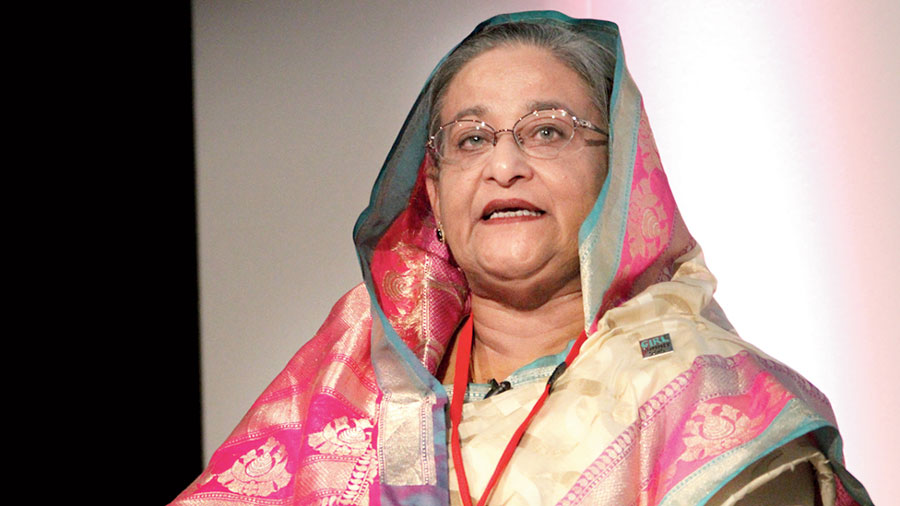Bangladesh Prime Minister Sheikh Hasina on Thursday urged the US to withdraw the sanctions it imposed on Russia as punishment for invading Ukraine before explaining how the unilateral decision "violated human rights" by "hurting the people across the world".
"When people suffer because of serious disruptions in commodity supply and rising prices, including fuel and fertilisers, this is a kind of violation of human rights... I don't really know what rationale there is for making people suffer like this. In a way, this is another violation of human rights." said Hasina, who stressed that the sanctions were affecting the whole world, including the developed countries like the US, the UK and the whole of Europe.
"I think that it is justified to retreat from the act of punishing one country which is hurting the people across the world,” she said, stressing the need for an end to the sanctions that the US and its allies have imposed on Russia.
The comment of the Bangladeshi Premier — during the inauguration of the new office of the ministry of foreign affairs — assumes significance at a time when the prolonged war has taken a toll on the Bangladeshi economy by pushing inflation to an eight-year high of 7.42 per cent in May and bringing forex reserves below $42 billion (the lowest in 18 months) last month.
The war and the retaliatory economic and financial sanctions jolted the Indian economy as well. The Reserve Bank had recently revised GDP growth downward by 60 basis points and inflation upward by 220 basis points, primarily because of the rise in crude oil prices.
Even as the US made an all-out effort to bring India on board with its sanctions against Russia, New Delhi has refused to join the EU and the US on sanctions. While external affairs minister S. Jaishankar has cleared the country's stand by stating that India cannot be a “pale imitation” of others or needs the “approval” of others, the Indian response to the sanctions has not been as direct as that of Hasina.
The fact that concerns about the Bangladesh economy were the trigger behind her comment became apparent as she took care to explain how the war and the sanctions imposed by the US thereafter were hitting her country.
"As we have the land and people, we have always tried to increase production [of food and other goods]. We wanted to produce our food and also, if possible, offer help to others. But we need diesel, fertilisers and other materials to increase production, which we are not getting now," said Hasina before adding how transportation costs have gone up and the availability of goods has shrunk.
This is not the first time that Hasina spoke about the impact of the war on the economy. In a video message that was broadcast in the seventy-eighth session of the Economic and Social Commission for Asia and the Pacific (ESCAP) of the UN on May 23, she dwelt extensively on how the poor and the developing countries were bearing the brunt of the war. She had also said at that meeting that the Russia-Ukraine conflict must be stopped "immediately".
The impact of the war, in the immediate aftermath of the pandemic, on Bangladesh, which has been growing at an average rate of over 6 per cent in the last decade or so, has forced the Hasina government to begin discussions with the IMF and the World Bank for budgetary support.
In her virtual address, Prime Minister Hasina said that the US must reconsider the sanctions imposed against Russia before adding that people should not be punished for the sake of punishing a particular country.
“I believe that no country can be controlled by imposing sanctions on it. Those who want to engage in a war, they can go on, but global goods transportation and import and export shouldn’t be hampered. The common people should not suffer,” said the Bangladesh Prime Minister before stressing that people in her country are against war as they want peace.
Hasina also used the occasion to highlight how the Rohingya crisis has become a huge burden for Bangladesh to continue supporting more than a million forcibly displaced nationals from Myanmar, who have been fleeing the country in the face of persecution by the armed forces for several years. The biggest influx of Rohingya nationals happened in 2017 when around 7 lakh people crossed over to Bangladesh.
“We offered them shelter on humanitarian grounds, but so many years have passed… They have become a big burden on us,” she said, before urging the international community to realise the situation of Bangladesh and take steps so that the Rohingyas can return to their homeland.











